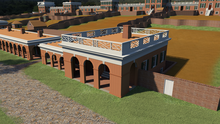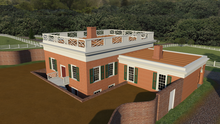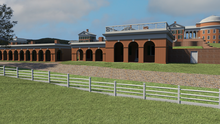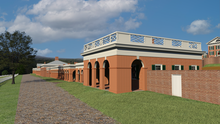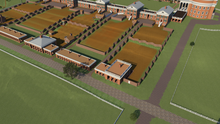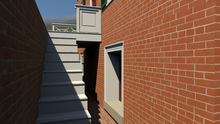The hotels of the early Academical Village served as dining and entertaining houses for the students. Hotelkeepers were also obligated to provide daily services for students- not only meals but also bedding, furniture, candles, washing, and menial duties. They were in charge of owning or renting enslaved individuals and hiring free blacks to complete these tasks. Hotelkeepers also acted as the eyes and ears of the University administration, responsible for reporting misconduct of students.
University records suggest that Hotel B did not serve as a hotel for very long before being turned over for other uses. Simeon B. Chapman was the first keeper of Hotel B; the Faculty Minutes of September 24, 1825 suggest that he had to forfeit his lease for allowing students to drink “ardent and vicious liquors” in his hotel.1
John B. Richeson succeeded Chapman as the keeper of Hotel B and held the position from 1826 to 1828. A letter Richeson wrote to the Board of Visitors in 1826 sheds some light on the physical conditions at Hotel B. He describes the flooding the cellar experiences during heavy rain, making it impossible to cook in the basement and making his family sick. He also states that unlike the other hotels, he doesn’t have convenient access to a well or water pump. All of his fireplaces smoke badly, and he suggests the addition of Franklin stoves for heating instead. He also states that his hotel is the smallest, and he has nowhere to store the goods he is required to provide to his boarders other than his smokehouse. Due to the storage issue, he claims that hotelkeepers resort to keeping two houses, as there isn’t enough space to both provide services to the students as well as have a family reside there. His letter also suggests that the system of letting students decide which hotel they board with, and the rent he pays as a hotelkeeper, are unfair. It’s unknown if the Board of Visitors addressed any of Richeson’s concerns.2
Another of Richeson’s letters, an introduction to Madison and the Executive Committee in November of 1827, implies that the University experienced lower than anticipated enrollment in its early years. He opens his letter by saying that he has been informed that the number of hotels that will be open for the following school year will be reduced, meaning fewer hotelkeeper positions. He tells Madison that he has a wife and seven children to support, and that he gave up his plantation in King William County to work at the University. He describes his impeccable service to his boarders, tells them that his neighbor and friend Dr. Blaettermann would provide a good reference, and ends by describing his father’s military service during the Revolutionary War. Records suggest that Richeson’s plea was not successful; he left his position as hotelkeeper in 1828.3
It appears that John B. Richeson was the last hotelkeeper of Hotel B. The years following Richeson’s occupation of Hotel B are unclear; William Wertenbaker, Assistant Proctor, may have occupied it briefly, as well as Lucy Brockenbrough, the widow of Proctor Arthur S. Brockenbrough.4 After Mrs. Brockenbrough left Hotel B in 1832, the Board of Visitors decided that the Office of the Proctor and the Janitor’s workshop would move from Pavilion VII to Hotel B; they remained there until 1846.5
In 1849, the Washington Literary Society and Debating Union, which was founded in 1835, was given a room in Hotel B to meet in. In 1852, the Society asked to expand its room, and in 1869 the Society expanded the hotel to its current dimensions by adding onto the north façade; it was during the Washington Society’s tenancy that Hotel B became more commonly known as Washington Hall. In 1929, after the Washington Society died out, the University took back possession of the building, although the Society itself was refounded in 1979. Today, Hotel B, still known as Washington Hall, is occupied by the Office for Equal Opportunity and Civil Rights.6
1 University of Virginia Faculty Minutes Vols. I-XIX, 1825-1970, RG-19/1/1.461, Special Collections, University of Virginia Library, Charlottesville, Va.
2 John B. Richeson to Board of Visitors, 2 October 1826.
3 John B. Richeson to Madison, 16 November 1827.
4 Board of Visitors Minutes, 1 July 1832.
5 Board of Visitors Minutes, 2 October 1833.
6 Bruce, Philip Alexander. History of the University of Virginia, 1819-1919, volumes 3 and 4. Centennial ed. The Macmillan company: New York, 1920.
|
Hotel B from the northeast |
Hotel B from the southwest |
Hotel B from the east |
|
Hotel B looking south down East Range |
Hotel B aerial from northeast |
Hotel B basement access |
